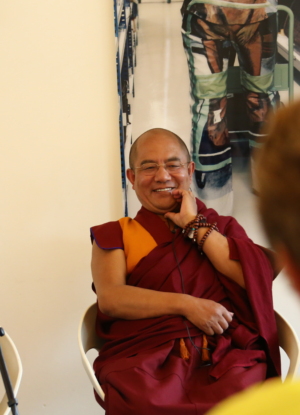Buddhism and Moral Conduct
In this talk, Khenpo Sodargye answers a few interesting but significant questions raised by the scholars or lecturers from Leiden University, Holland. These question covered a wide range of topics, including but not limited to the explanation of “mind terma” and how it works, and whether the dependence on the modern socio-economic system would sicken the everyday life of people.
Will Love and Marriage Impede Spiritual Development
The Influence of Hinduism on Tibetan Buddhism
It has been speculated in Han China that Tibetan Buddhism is an offshoot of Hinduism and shares similar tenets with the Vedas. Actually, there are huge differences between the two. For instance, the Lord of Desire in Hinduism indulges in sensual pleasures with attachment. In Vajrayana, desire itself is the Wisdom of Discernment, and at the subtlest level, the mind is empty that never arises and luminous that never ceases. The indivisible nature of emptiness and luminosity is depicted as the union deities of father and mother, and the true nature of afflictive emotions does not deviate from the awakened mind.
Does the Socio-economic System Make People Sick?
All of us have different sicknesses and sufferings, which according to the Buddha, are mainly caused by our past misdeeds, present actions and to a certain extent by environmental factors. Nowadays, many countries are engaging in socio-economic development activities such as mining or other heavy industries that severely damage our planet. Air pollution, water contamination, illegal food additives to name a few are causing illnesses to more and more people. Unfortunately, these kinds of “developments” have become a trend, which is hard to change in a short period of time.
Will Love and Marriage Impede Spiritual Development?
Question: As humans, we all long for and can be nurtured by love and companionships. Will this become an obstacle for the progress in the spiritual path?
Khenpo Sodargye: The greatest obstacle on the spiritual path is not the relationships but to harbor wrong views. For example, to think that practicing the Dharma is useless or meaningless, or to abandon the Dharma altogether. It is quoted in the scripture that it is worse for one to lose the right view than to violate the precepts. It is because, the broken precepts can be repaired by confession and repentance, but wrong views undermine any authentic Dharma practice. Therefore, the important thing to do is to guard one’s mind and keep up with one’s Dharma practice.
How Do We Think of the Karmic Law of Cause and Effect?
There are many types of karma. Some of them ripen in the present lifetime. For instance, the effect of generosity or patience may manifest swiftly. Other Karma, such as committing five crimes with immediate retribution including the killing of one’s own parents, will definitely materialize in the next life. Some Karma may take many lifetimes to mature, while some others are mutable, in that if strong antidotes are applied they may not bear any effect. Nowadays, many people perform good deeds and wish to experience karmic reward right here in this life, which is impractical. This is analogous to planting seeds by the farmers; even though a quick harvest is preferred, they have no choice but to wait until autumn. The sutra summarizes the work of karma well, “if you want to know what happened in the previous life, look closely at your current circumstances; if you want to know what will happen in the next life, look closely at what you are doing now.”
How Do We Understand H.H. Jigme Phuntsok Rinpoche’s Last Words?
Our Guru Jigme Phuntsok Rinpoche passed away in a hospital in Chengdu. At that time, he gave us his final teaching over the phone, which was, “Do not lose your own path. Do not disturb others’ minds.” The first part of this statement means that if you’re a Dharma practitioner, do not give up your practice; and in terms of worldly living, do not forsake your identity. For instance, I’m a Tibetan, so I’ll uphold the Tibetan tradition. Likewise, a teacher has the teachers’ code to follow. Actually, our guru’s advice is applicable to many situations in that we should all uphold our own principles in whatever we do. The second part “do not disturb others’ minds” teaches us about our daily interactions with people. We respect those above us, get along well with those equal of us and empathize with those under us. Acting according to this teaching will never cause us to disturb others’ minds.

The Influence of Hinduism on Tibetan Buddhism
It has been speculated in Han China that Tibetan Buddhism is an offshoot of Hinduism and shares similar tenets with the Vedas. Actually, there are huge differences between the two. For instance, the Lord of Desire in Hinduism indulges in sensual pleasures with attachment. In Vajrayana, desire itself is the Wisdom of Discernment, and at the subtlest level, the mind is empty that never arises and luminous that never ceases.

How Do We Think of the Karmic Law of Cause and Effect?
Nowadays, many people perform good deeds and wish to experience karmic reward right here in this life, which is impractical. This is analogous to planting seeds by the farmers; even though a quick harvest is preferred, they have no choice but to wait until autumn.
“From both the Buddhist and the mundane point of view, whether you’re a teacher, a student, or whatever identity you’re holding, if you adhere to your own principles, and meanwhile get along with others, I think you can be called a very good person.”
















